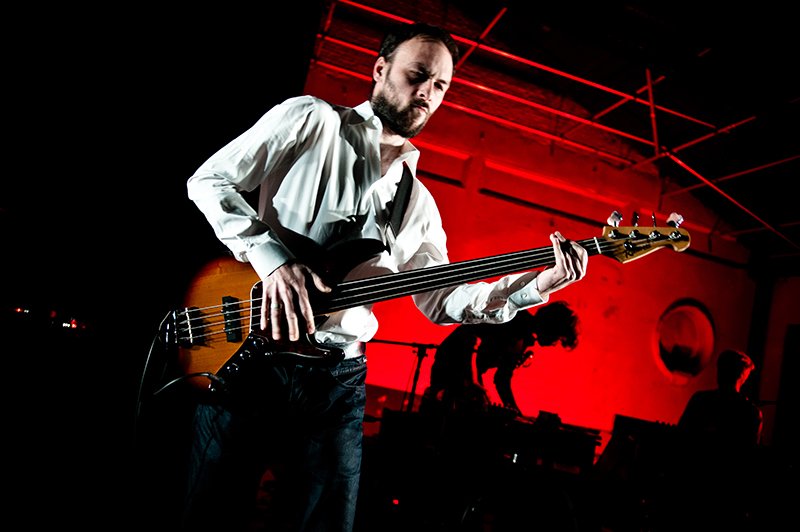"Macbeth" | Chicago Shakespeare Theater at Thalia Hall
Zuidpool by Raymond Mallentjer
3 out of 4 stars
(Originally published on Chicago Stage Standard)
In part with the yearlong Shakespeare 400 Chicago celebration, Belgium’s Theater Zuidpool presented a two-night-only performance of Macbeth at historic concert venue Thalia Hall. Described as an alternative rock concert, this performance is not advised for delicate ears. Shrieking witches, twangy interludes and booming ferocity melded all together makes this piece nothing short of profound.
The beloved hauntingly tragic Scottish play, which displays the psychological and physical repercussions of seeking power just for the sake of power, is told through a rock concert aesthetic. The critical technical cues are performed wonderfully. It is as if one were watching an audiobook and fallen down the rabbit hole into the basement of CBGB. An experimental musical experience that seems befitting for a black box performance thrown into an opera concert hall. The sound envelops and reverberates deep down into your core by the droning drums mimicking heartbeats. What this performance lacks in physicality makes up for with mental imagery told through voice. Lady Macbeth, played by Sofie Decleir, surprises in her dynamic role and delivery of poignant poetry. While Jorge Cassier exemplifies a complete transition to mental instability in playing the titular role of Macbeth. Cassier’s performance showcases impressive restraint in a moralistic human being zombified to a wild power hungry murder. The power of words is utilized effectively to pull the audience through the various twisted characters minds.
Zuidpool has a long reigning history and is currently lead by Artistic Directors Jorgen Cassier, Koen van Kamm, and Sofie Decleir. All of whom are actors, musicians, directors, translators and writers that have produced more than 20 versatile co-productions. The direction of this play was superb and highlights a remarkably artist focused group. The slow deterioration of the Bard’s tragic character is perfectly illustrated by the original score written by Mauro Pawloski of dEUS and Tigs Delbeke of Sir Yes Sir. Sequentially, the musical range guides that audience through Macbeth’s mental derangement from the prelude of murder to the culmination of chaotic insanity. Soft off beat noise intermittently is plucked away with transitioning into other various genres such as repetitive beats of EDM and the extreme passions found in punk rock, metal, and hardcore. The high notes of insanity and the drums of paranoia echoes in the vast space only this extraordinary venue could provide. The ability to produce such a high energy piece it would not be possible without key team players such as, Sjoerd Bruil and Arne Leurentop on guitars, percussion, synth and voice. While everyone contributed to aiding the musical filler in order to create a robust sound, these two individuals blazoned their amazing talent among the instruments and management of pre-recorded tracks. A profoundly solid basis for a complex auditory piece that would fall flat otherwise.
The back wall of exposed brick adorned with piping, exit sign and writing left from years gone by sets the stage. A most befitting choice for the event as it adds to the bare raw emotional pull this literary work holds. Key blocking moments projects onto the back wall adding context. As a collaborative effort the costuming choice was minimal black wardrobe complimenting the non-dressed stage. Musicians and actors mix together and equalize hierarchy with the only exception in Macbeth’s white button down shirt. The colors white versus black most notable is a symbolic moral struggle in contrast to his wife. Lady Macbeth dressed in a blazer nods to her masculinity reflected by her motives, yet the breadth of her character goes so much further. The monotone costuming expands and heightens Macbeth and Lady Macbeth’s extreme emotional range. The talented David Van Hove, responsible for lighting design, beautifully pairs the optical with the musical. A majority of the production was cast entirely in sidelight creating harsh shadows upon the performer’s faces. Plotting a simple subtle transition from dark reds of passion to greens of envy to stark whites of realization was ingenious for a work so complex. Visually stunning! The choice in lighting draws the attention to the traditional piece and transports it into another medium of art. Each lighting movement molds the variable auditory noise into a contemporary color based story line.
Zuidpool does not disappoint for an electric experience of theatrical performance, this is for sure. While it may not suit everyone’s palette, the effort and structure alone of this piece is one to commend and applaud. The company holds esteemed involvement in the arts community. Their Antwerp home theater had the honor of curating Theater Aan Zee, the largest summer arts festival in Belgium with over 120,000 visitors last year. A gem of the international stage shared with our city via Chicago Shakespeare Theater was such a treat! Theater Zuidpool is a powerhouse and one can only imagine what they’ll do next.
For more information on Theater Zuidpool and their company, please visit their website: http://www.zuidpool.be or https://www.facebook.com/zuid.pool
To see more what is happening for Shakespeare 400 throughout the year at Chicago Shakespeare Theater, please visit: www.chicagoshakes.com
Photos by Raymon Mallentjer

